Unit2 What time do you go to schoo 同步导学精炼(知识点和语法汇总)
文档属性
| 名称 | Unit2 What time do you go to schoo 同步导学精炼(知识点和语法汇总) | 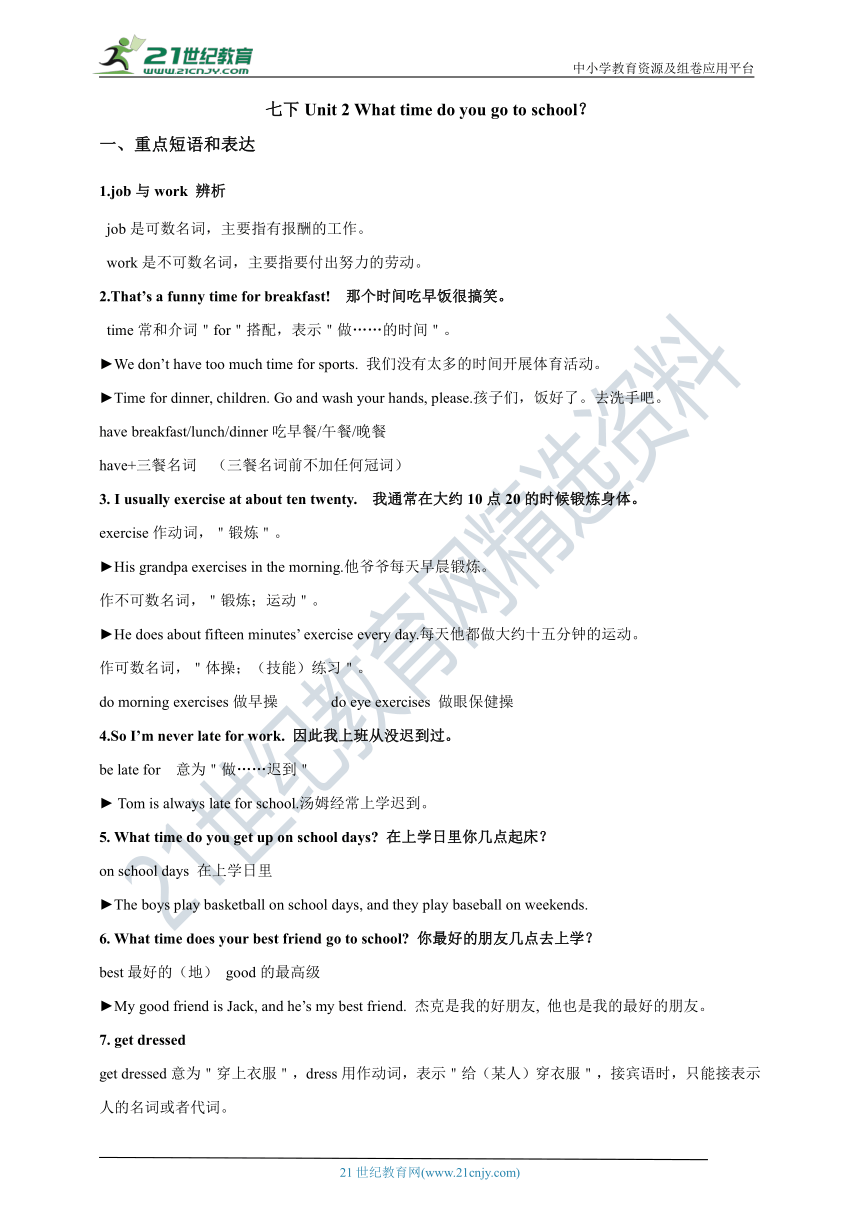 | |
| 格式 | zip | ||
| 文件大小 | 1.3MB | ||
| 资源类型 | 试卷 | ||
| 版本资源 | 人教新目标(Go for it)版 | ||
| 科目 | 英语 | ||
| 更新时间 | 2021-03-06 08:47:30 | ||
图片预览

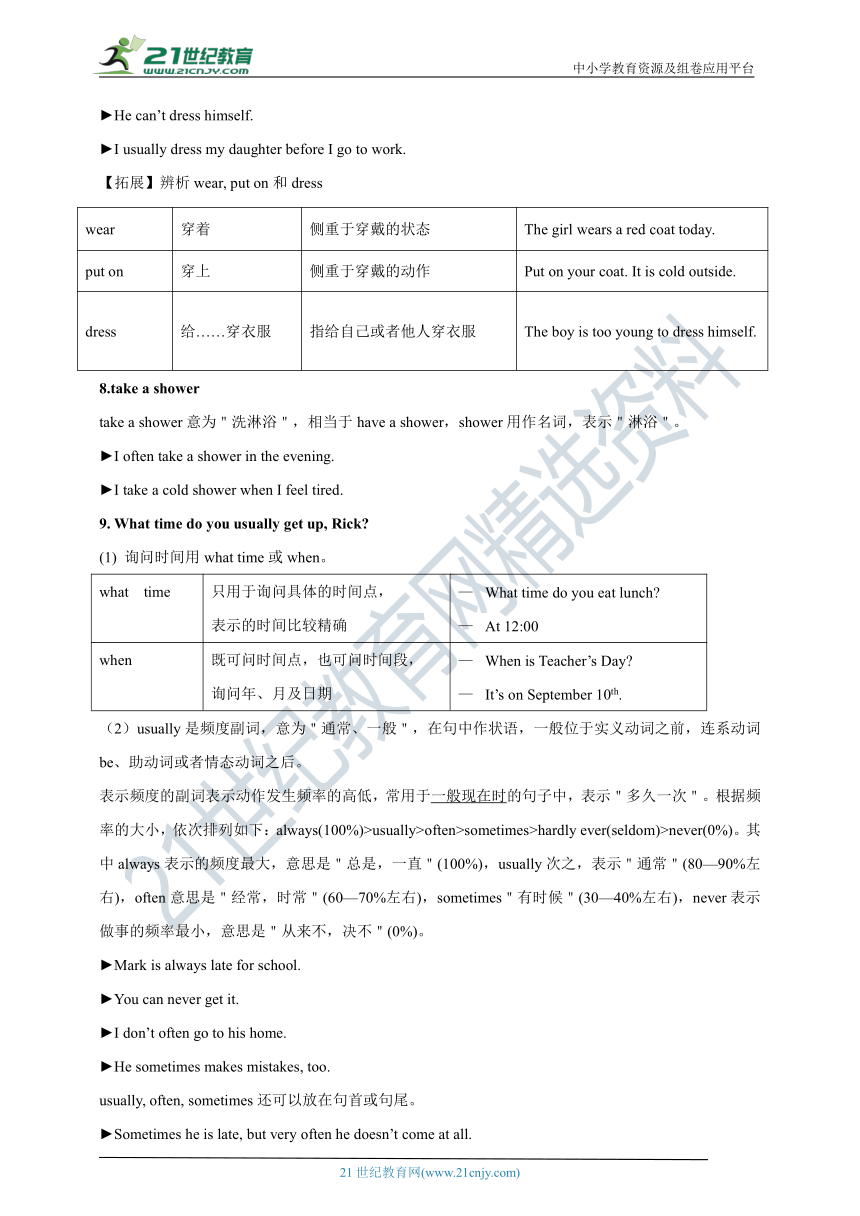
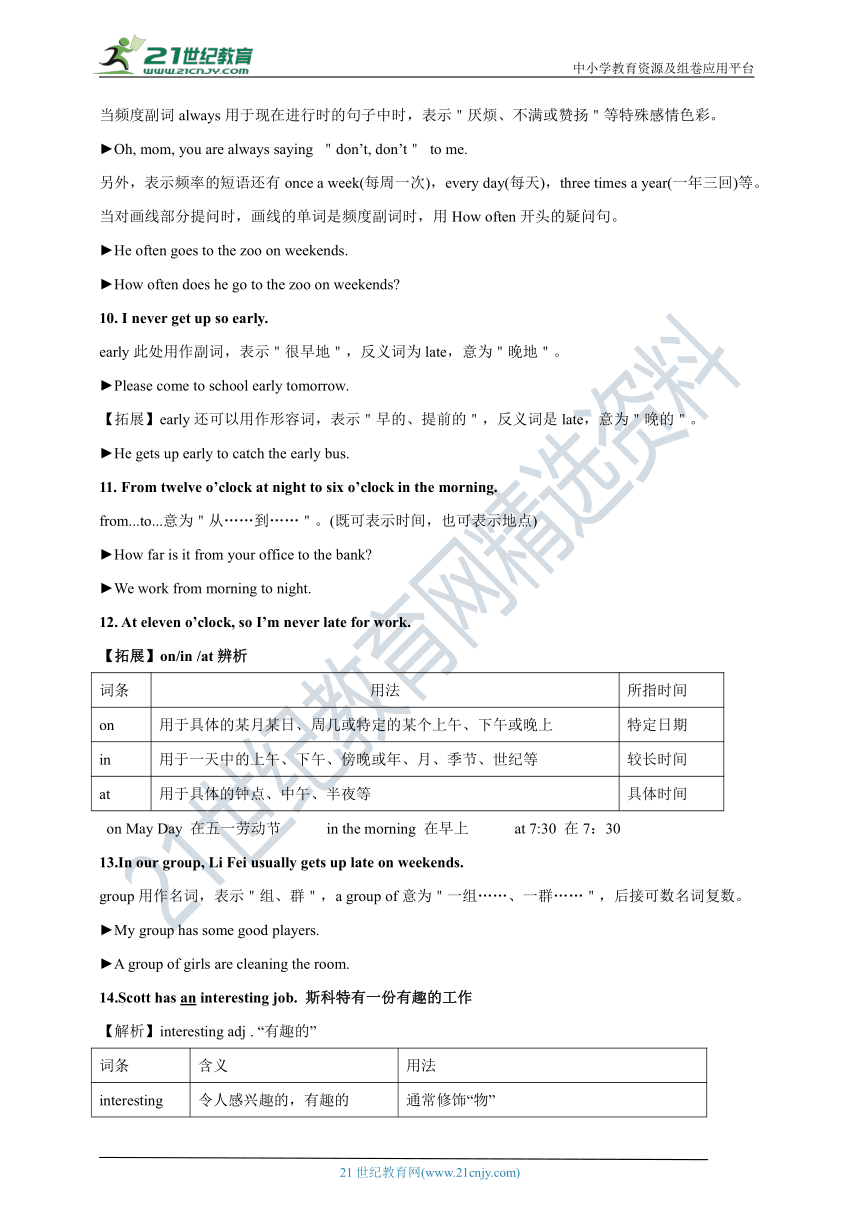
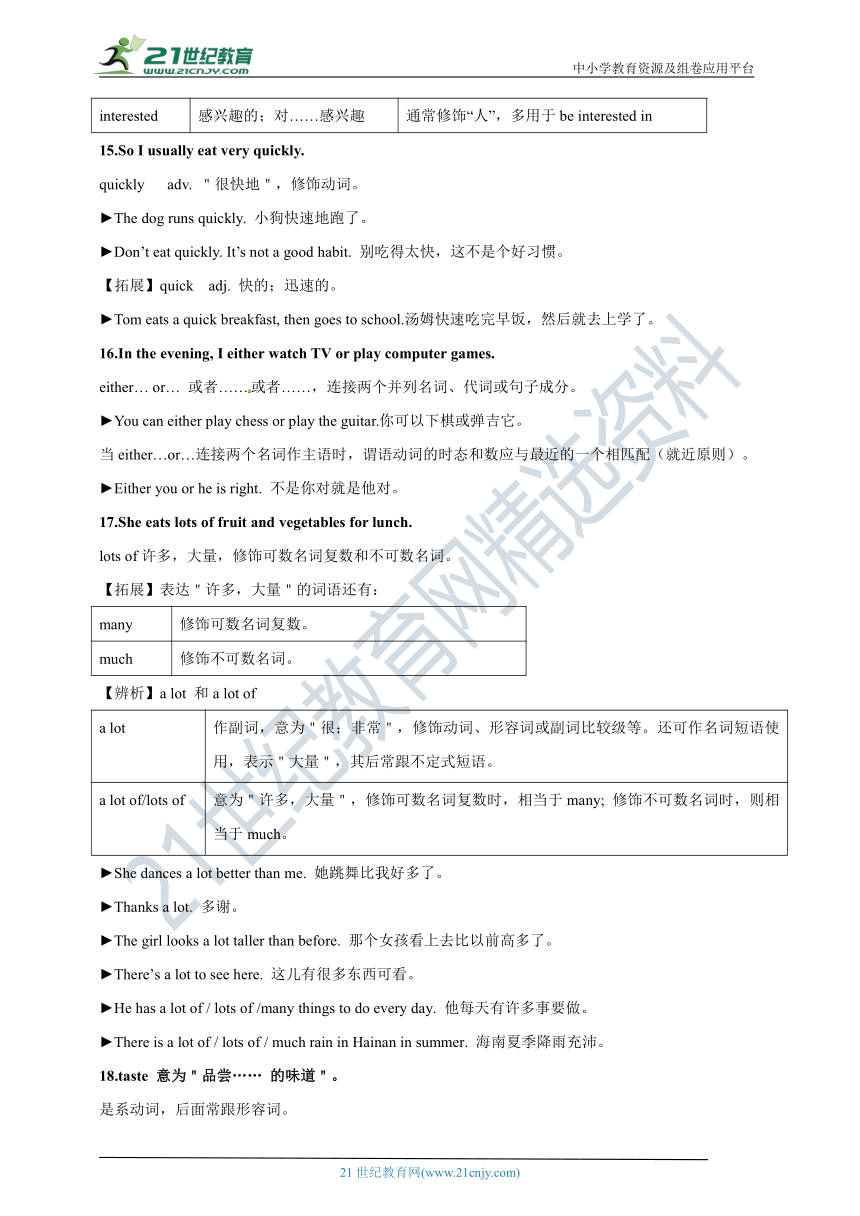
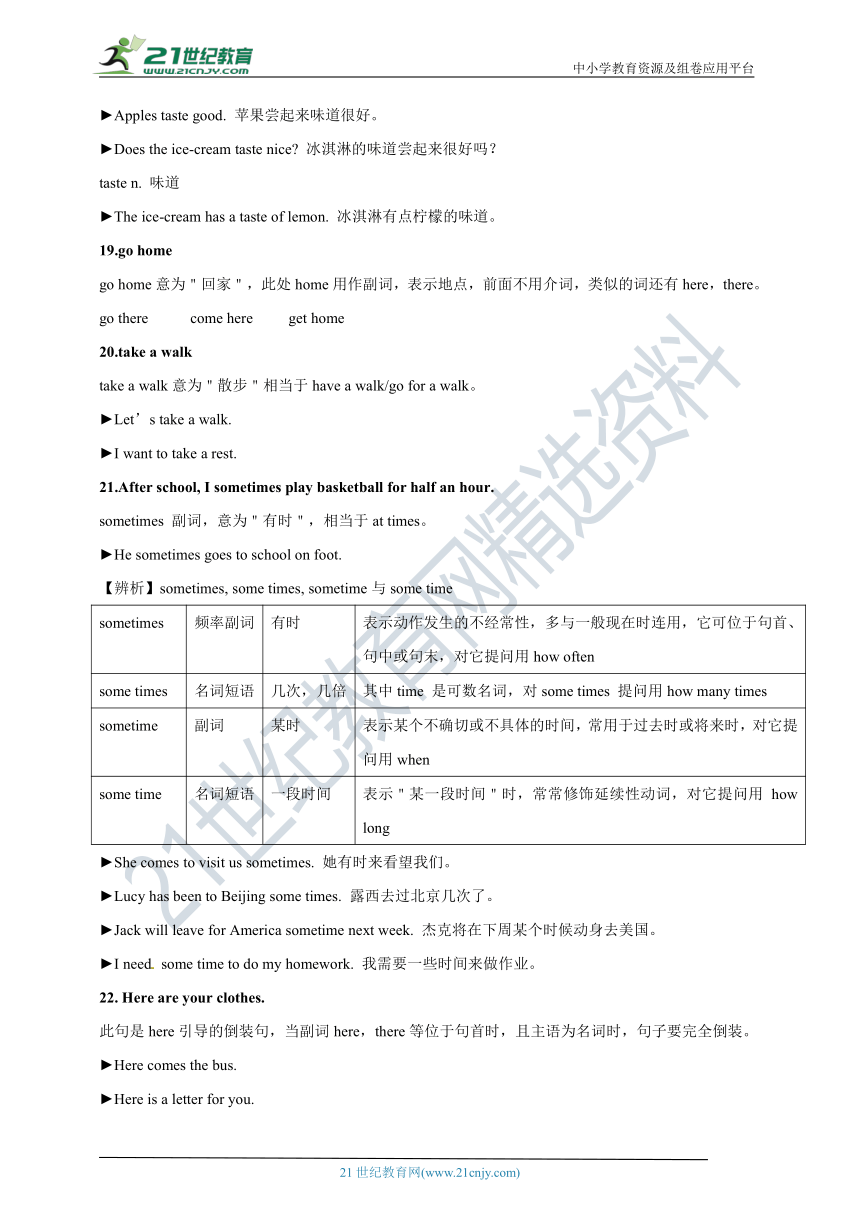
文档简介
中小学教育资源及组卷应用平台
七下Unit
2
What
time
do
you
go
to
school?
一、重点短语和表达
1.job与work
辨析
job是可数名词,主要指有报酬的工作。
work是不可数名词,主要指要付出努力的劳动。
2.That’s
a
funny
time
for
breakfast!
那个时间吃早饭很搞笑。
time常和介词"for"搭配,表示"做……的时间"。
?We
don’t
have
too
much
time
for
sports.
我们没有太多的时间开展体育活动。
?Time
for
dinner,
children.
Go
and
wash
your
hands,
please.孩子们,饭好了。去洗手吧。
have
breakfast/lunch/dinner吃早餐/午餐/晚餐
have+三餐名词
(三餐名词前不加任何冠词)
3.
I
usually
exercise
at
about
ten
twenty.
我通常在大约10点20的时候锻炼身体。
exercise作动词,"锻炼"。
?His
grandpa
exercises
in
the
morning.他爷爷每天早晨锻炼。
作不可数名词,"锻炼;运动"。
?He
does
about
fifteen
minutes’
exercise
every
day.每天他都做大约十五分钟的运动。
作可数名词,"体操;(技能)练习"。
do
morning
exercises做早操
do
eye
exercises
做眼保健操
4.So
I’m
never
late
for
work.
因此我上班从没迟到过。
be
late
for
意为"做……迟到"
?
Tom
is
always
late
for
school.汤姆经常上学迟到。
5.
What
time
do
you
get
up
on
school
days?
在上学日里你几点起床?
on
school
days
在上学日里
?The
boys
play
basketball
on
school
days,
and
they
play
baseball
on
weekends.
6.
What
time
does
your
best
friend
go
to
school?
你最好的朋友几点去上学?
best最好的(地)
good的最高级
?My
good
friend
is
Jack,
and
he’s
my
best
friend.
杰克是我的好朋友,
他也是我的最好的朋友。
7.
get
dressed
get
dressed意为"穿上衣服",dress用作动词,表示"给(某人)穿衣服",接宾语时,只能接表示人的名词或者代词。
?He
can’t
dress
himself.
?I
usually
dress
my
daughter
before
I
go
to
work.
【拓展】辨析wear,
put
on和dress
wear
穿着
侧重于穿戴的状态
The
girl
wears
a
red
coat
today.
put
on
穿上
侧重于穿戴的动作
Put
on
your
coat.
It
is
cold
outside.
dress
给……穿衣服
指给自己或者他人穿衣服
The
boy
is
too
young
to
dress
himself.
8.take
a
shower
take
a
shower意为"洗淋浴",相当于have
a
shower,shower用作名词,表示"淋浴"。
?I
often
take
a
shower
in
the
evening.
?I
take
a
cold
shower
when
I
feel
tired.
9.
What
time
do
you
usually
get
up,
Rick?
(1)
询问时间用what
time或when。
what
time
只用于询问具体的时间点,表示的时间比较精确
What
time
do
you
eat
lunch?At
12:00
when
既可问时间点,也可问时间段,询问年、月及日期
When
is
Teacher’s
Day?It’s
on
September
10th.
(2)usually是频度副词,意为"通常、一般",在句中作状语,一般位于实义动词之前,连系动词be、助动词或者情态动词之后。
表示频度的副词表示动作发生频率的高低,常用于一般现在时的句子中,表示"多久一次"。根据频率的大小,依次排列如下:always(100%)>usually>often>sometimes>hardly
ever(seldom)>never(0%)。其中always表示的频度最大,意思是"总是,一直"(100%),usually次之,表示"通常"(80—90%左右),often意思是"经常,时常"(60—70%左右),sometimes"有时候"(30—40%左右),never表示做事的频率最小,意思是"从来不,决不"(0%)。
?Mark
is
always
late
for
school.
?You
can
never
get
it.
?I
don’t
often
go
to
his
home.
?He
sometimes
makes
mistakes,
too.
usually,
often,
sometimes还可以放在句首或句尾。
?Sometimes
he
is
late,
but
very
often
he
doesn’t
come
at
all.
当频度副词always用于现在进行时的句子中时,表示"厌烦、不满或赞扬"等特殊感彩。
?Oh,
mom,
you
are
always
saying
"don’t,
don’t"
to
me.
另外,表示频率的短语还有once
a
week(每周一次),every
day(每天),three
times
a
year(一年三回)等。当对画线部分提问时,画线的单词是频度副词时,用How
often开头的疑问句。
?He
often
goes
to
the
zoo
on
weekends.
?How
often
does
he
go
to
the
zoo
on
weekends?
10.
I
never
get
up
so
early.
early此处用作副词,表示"很早地",反义词为late,意为"晚地"。
?Please
come
to
school
early
tomorrow.
【拓展】early还可以用作形容词,表示"早的、提前的",反义词是late,意为"晚的"。
?He
gets
up
early
to
catch
the
early
bus.
11.
From
twelve
o’clock
at
night
to
six
o’clock
in
the
morning.
from...to...意为"从……到……"。(既可表示时间,也可表示地点)
?How
far
is
it
from
your
office
to
the
bank?
?We
work
from
morning
to
night.
12.
At
eleven
o’clock,
so
I’m
never
late
for
work.
【拓展】on/in
/at辨析
词条
用法
所指时间
on
用于具体的某月某日、周几或特定的某个上午、下午或晚上
特定日期
in
用于一天中的上午、下午、傍晚或年、月、季节、世纪等
较长时间
at
用于具体的钟点、中午、半夜等
具体时间
on
May
Day
在五一劳动节
in
the
morning
在早上
at
7:30
在7:30
13.In
our
group,
Li
Fei
usually
gets
up
late
on
weekends.
group用作名词,表示"组、群",a
group
of意为"一组……、一群……",后接可数名词复数。
?My
group
has
some
good
players.
?A
group
of
girls
are
cleaning
the
room.
14.Scott
has
an
interesting
job.
斯科特有一份有趣的工作
【解析】interesting
adj
.
“有趣的”
词条
含义
用法
interesting
令人感兴趣的,有趣的
通常修饰“物”
interested
感兴趣的;对……感兴趣
通常修饰“人”,多用于be
interested
in
15.So
I
usually
eat
very
quickly.
quickly
adv.
"很快地",修饰动词。
?The
dog
runs
quickly.
小狗快速地跑了。
?Don’t
eat
quickly.
It’s
not
a
good
habit.
别吃得太快,这不是个好习惯。
【拓展】quick
adj.
快的;迅速的。
?Tom
eats
a
quick
breakfast,
then
goes
to
school.汤姆快速吃完早饭,然后就去上学了。
16.In
the
evening,
I
either
watch
TV
or
play
computer
games.
either…
or…
或者……或者……,连接两个并列名词、代词或句子成分。
?You
can
either
play
chess
or
play
the
guitar.你可以下棋或弹吉它。
当either…or…连接两个名词作主语时,谓语动词的时态和数应与最近的一个相匹配(就近原则)。
?Either
you
or
he
is
right.
不是你对就是他对。
17.She
eats
lots
of
fruit
and
vegetables
for
lunch.
lots
of许多,大量,修饰可数名词复数和不可数名词。
【拓展】表达"许多,大量"的词语还有:
many
修饰可数名词复数。
much
修饰不可数名词。
【辨析】a
lot
和a
lot
of
a
lot
作副词,意为"很;非常",修饰动词、形容词或副词比较级等。还可作名词短语使用,表示"大量",其后常跟不定式短语。
a
lot
of/lots
of
意为"许多,大量",修饰可数名词复数时,相当于many;
修饰不可数名词时,则相当于much。
?She
dances
a
lot
better
than
me.
她跳舞比我好多了。
?Thanks
a
lot.
多谢。
?The
girl
looks
a
lot
taller
than
before.
那个女孩看上去比以前高多了。
?There’s
a
lot
to
see
here.
这儿有很多东西可看。
?He
has
a
lot
of
/
lots
of
/many
things
to
do
every
day.
他每天有许多事要做。
?There
is
a
lot
of
/
lots
of
/
much
rain
in
Hainan
in
summer.
海南夏季降雨充沛。
18.taste
意为"品尝……
的味道"。
是系动词,后面常跟形容词。
?Apples
taste
good.
苹果尝起来味道很好。
?Does
the
ice-cream
taste
nice?
冰淇淋的味道尝起来很好吗?
taste
n.
味道
?The
ice-cream
has
a
taste
of
lemon.
冰淇淋有点柠檬的味道。
19.go
home
go
home意为"回家",此处home用作副词,表示地点,前面不用介词,类似的词还有here,there。
go
there
come
here
get
home
20.take
a
walk
take
a
walk意为"散步"相当于have
a
walk/go
for
a
walk。
?Let’s
take
a
walk.
?I
want
to
take
a
rest.
21.After
school,
I
sometimes
play
basketball
for
half
an
hour.
sometimes
副词,意为"有时",相当于at
times。
?He
sometimes
goes
to
school
on
foot.
【辨析】sometimes,
some
times,
sometime与some
time
sometimes
频率副词
有时
表示动作发生的不经常性,多与一般现在时连用,它可位于句首、句中或句末,对它提问用how
often
some
times
名词短语
几次,几倍
其中time
是可数名词,对some
times
提问用how
many
times
sometime
副词
某时
表示某个不确切或不具体的时间,常用于过去时或将来时,对它提问用when
some
time
名词短语
一段时间
表示"某一段时间"时,常常修饰延续性动词,对它提问用
how
long
?She
comes
to
visit
us
sometimes.
她有时来看望我们。
?Lucy
has
been
to
Beijing
some
times.
露西去过北京几次了。
?Jack
will
leave
for
America
sometime
next
week.
杰克将在下周某个时候动身去美国。
?I
need
some
time
to
do
my
homework.
我需要一些时间来做作业。
22.
Here
are
your
clothes.
此句是here引导的倒装句,当副词here,there等位于句首时,且主语为名词时,句子要完全倒装。
?Here
comes
the
bus.
?Here
is
a
letter
for
you.
【练习】
完成句子。
1.鲍勃想找一份好的工作。
Bob
wants
to
find
a
good________.
2.
今天我有很多工作要做。
I
have
much
________
to
do
today.
3.
她每天六点钟去上班。
She
goes
to
________
at
six
o’clock.
4.Don’t
worry.
I’ll
buy
some
________________(interest)
books
for
you.
【答案】1.
job
2.
work
3.
work
4.interesting
单项选择题。
His
father
usually
________
at
seven
o’clock
in
the
morning.
exercises
B.exercise
C.is
exercising
D.exercised
2.The
lazy
boy
________
always
________
________
work.
A.is;
late
for
B.are;lazy
for
C.was;late
for
D.is;lazy
to
3.Who
is
_________
in
English
in
your
class?
A.
good
B.
better
C.
the
best
D.
well
4.
Mike
________
the
early
morning
news
on
TV.
A.
watches
B.
sees
C.
looks
at
D.
looks
5.Their
favorite
sport
is
football,
and
they
________
play
it
after
school.
A.
never
B.
too
C.
always
D.
very
6.Tony
often
________
a
shower
after
he
gets
up.
A.
has
B.
takes
C.
by
D.
get
7.We
can’t
play
computer
games
________
night.
A.
in
B.
for
C.
with
D.
at
8.—________
does
Mary
get
up
________school
days?
—________
7:00.
A.What
time,on;At
B.
What
time,in;On
C.
What
time,on;In
D.
How,in;At
9.—I
don’t
have
much
time
for
breakfast,
so
I
usually
eat
very
________.
—Lucy
often
eats
a
________
breakfast,
too.
A.
quick;
quick
B.
quickly;
quick
C.
quick;
quickly
D.
quickly;
quickly
10.You
can
________
stay
at
home
________
go
out
to
play.
A.
either;
or
B.
so;
that
C.
neither;
nor
D.
both;
and
11.He
drinks
________
Cola
every
day.
A.
a
lot
B.
a
lot
of
C.
a
lots
of
D.
many
12.
One
of
the
hamburgers
________
salty(咸的).
Do
you
want
________
it?
A.
are;
taste
B.
are;
to
taste
C.
is;
taste
D.
is;
to
taste
13.
—Dose
the
moon
cake
________
nice?
—Yes,
it’s
really
delicious!
sound
B.
feel
C.
look
D.
taste
14.
—What
time
do
you
often
do
your
homework?
—We
do
________
at
7:30
p.
m.
A.
my
homeworks
B.
our
homework
C.
our
homeworks
D.
my
homework
15.
Bill
goes
to
bed
at
________
to
ten
in
the
evening.
A.
quarter
B.
quarters
C.
a
quarter
D.
three
quarters
16.
—Let’s
________
after
dinner.
—OK,
good
idea.
A.
talk
a
walking
B.
talk
walk
C.
take
a
walk
D.take
walk
17.
We
often
eat
breakfast
________
twenty
past
seven
________
the
morning.
A.
at;
in
B.
in;
on
C.
at;
at
D.
in;
at
18.
Lily
________
her
room
every
day,
so
her
room
is
very
________.
A.
clean;
clean
B.
cleans;
cleans
C.
clean;
cleans
D.
cleans;
clean
19.—________
is
your
mother’s
birthday?
—It’s
May
8th.
What
B.
Where
C.
Which
D.
When
20.
—________
do
you
play
computer
games?
—Sometimes.
A.
When
B.
What
time
C.
How
often
D.
How
many
1-5
AACAC
6-10
BDABA
11-15
BDDBC
16-19
CADDC
用括号内所给单词的适当形式填空。
1.
What
time
________your
father
________
(get)up
on
the
weekend?
2.
My
sister
usually
________
(brush)her
teeth
first
in
the
morning.
3.
Kate
always
________
(go)to
work
at
6:30
in
the
morning.
4.
I
always
get
________
(dress)at
six
o’clock
in
the
morning.
5.
Ann
never
________
(play)computer
games
at
school.
1.
does;get
2.
brushes
3.
goes
4.
dressed
5.
plays
按要求完成下列句子,每空一词。
1.
Jane
usually
gets
up
at
half
past
five
in
the
morning.
(对画线部分提问)
________
________
________
Jane
usually
________
up
in
the
morning?
2.
Mary’s
father
works
in
a
hospital.
(改为一般疑问句)
________Mary’s
father
________
in
a
hospital?
3
I
usually
exercise
in
the
morning.
(对画线部分提问)
________
________
you
usually
exercise?
4.
Alice
always
gets
up
early.
(改为否定句)
Alice
________
gets
up
early.
5.
They
often
go
to
school
at
half
past
seven
in
the
morning.
(用he改写句子)
He
often
________
________
________
at
half
past
seven
in
the
morning.
6.
My
sister
does
her
homework
at
7
o’clock.
(改为否定句)
My
sister
________
________
her
homework
at
7
o’clock.
7.
Sam
often
runs
in
the
morning.(改为一般疑问句)
________Sam
often
________in
the
morning?
8.
Lily
usually
goes
to
bed
at
half
past
nine.
(对画线部分提问)
________
________
________
Lily
usually
go
to
bed?
9.
What
time
does
Mike
eat
dinner?
(改为同义句)
________
________
Mike
________dinner?
10.
The
students
usually
eat
lunch
at
school.
(对画线部分提问)
________
________
the
students
usually
eat
lunch?
What
time
does;get
2.
Does;work
3.
When
do
4.
never
5.
goes
to
school
6.
doesn’t
do
7.
Does;run
8.
What
time
does
9.
When
does;have
10.
Where
do
根据汉语意思完成句子。
1.
我不喜欢早起。
I
like
________
________
________
________.?
2.
该上课了。
It’s
class.?
3.
晚饭后她总是吃冰淇淋。
She
always
ice-cream
dinner.?
4.
苹果吃起来很甜。
The
apple
.?
5.
每天锻炼有益于身体健康。
Exercising
every
day
is
your
health.?
1.
don’t;
to
get
up
early
2.
time
for
3.
eats;
after
4.
tastes
sweet
5.
good
for
二、重点语法
一般现在时的运用
一般现在时的判断:判断一个句子用不用一般现在时,可以从以下几个方面着手:
1.
当句中用到副词often(经常)、usually(通常)、sometimes(有时)或always(总是)等,同时该句中无表示在过去或在将来的时间状语时,这个句子就用一般现在时。
?The
student
often
plays
basketball
at
school.那个学生经常在学校打篮球。
?My
friends
always
help
me
with
my
Chinese.我的朋友们总是帮我学汉语。
?Sometimes
Jim
plays
the
piano
after
lunch.吉姆有时在午餐后弹钢琴。
2.一般现在时常和类似every
day,
in
the
morning,
on
Sunday,
at
eight
o’clock,
in
the
morning等具有周期性的时间状语连用。
?That
teacher
takes
the
number
17
bus
to
school
in
the
morning.那名教师早上乘坐17路公交车去学校。
?I
watch
TV
every
day.我每天看电视。
3.一般表示某人或某物现阶段的特征、性质、能力等以及现实社会和自然界中的客观现象,包括真理性的内容时,用一般现在时的句子表达。
?The
girl
is
beautiful(美丽的).
She
works
in
a
shop.
那个女孩很漂亮。她在一家商店工作。
?The
earth
goes
around
the
sun.
地球绕着太阳转。
【典例】1.
I
_________
have
breakfast
at
7:00.
But
_________
it’s
7:20.
I’m
having
my
breakfast.
A.
usually;
often
B.
often;
usually
C.
sometimes;
often
D.
usually;
now
【答案】D
2.
George
is
very
healthy.
He
_________
goes
to
the
doctor.
A.
always
B.
seldom
C.
often
D.
usually
【答案】B
英文时刻表达法
分类
用法
举例
整点法
时间为整点时,可用“整点数+o’clock”表示。
o’clock
只能用在表示整点的时间后面,也可省略
It’s
five
o’clockIt’s
five.
顺读法
“先时后分“,先读整点数,再读分钟数,都用基数词来读
6:30
six
thirty2:58
two
fifty-eight
逆读法
a,分钟数小于30,用“分钟数+past+整点数”表示;b,分钟数为30时,用“half
past
+整点数”
表示c,分钟数超过30时,用“60减去分钟数+
to
+下一个整点数”
表示d,
分钟数是15时,
可用a
quarter
表示
8:10
ten
past
eight1:30
half
past
one5:56
four
to
six10:15
a
quarter
past
ten5:45
a
quarter
to
six
【练习】
根据英文写出相应的时间
1.
half
past
six
___________
2.
seven
thirty
___________
3.
a
quarter
past
nine____________
4.
ten
to
ten
___________
5.
three
o’clock
____________
6.
four
twenty
–five
__________
Keys:
1.六点三十
2.七点三十
3.九点十五
4.九点五十
5.三点整
6.四点二十五
21世纪教育网
www.21cnjy.com
精品试卷·第
2
页
(共
2
页)
HYPERLINK
"http://21世纪教育网(www.21cnjy.com)
"
21世纪教育网(www.21cnjy.com)
七下Unit
2
What
time
do
you
go
to
school?
一、重点短语和表达
1.job与work
辨析
job是可数名词,主要指有报酬的工作。
work是不可数名词,主要指要付出努力的劳动。
2.That’s
a
funny
time
for
breakfast!
那个时间吃早饭很搞笑。
time常和介词"for"搭配,表示"做……的时间"。
?We
don’t
have
too
much
time
for
sports.
我们没有太多的时间开展体育活动。
?Time
for
dinner,
children.
Go
and
wash
your
hands,
please.孩子们,饭好了。去洗手吧。
have
breakfast/lunch/dinner吃早餐/午餐/晚餐
have+三餐名词
(三餐名词前不加任何冠词)
3.
I
usually
exercise
at
about
ten
twenty.
我通常在大约10点20的时候锻炼身体。
exercise作动词,"锻炼"。
?His
grandpa
exercises
in
the
morning.他爷爷每天早晨锻炼。
作不可数名词,"锻炼;运动"。
?He
does
about
fifteen
minutes’
exercise
every
day.每天他都做大约十五分钟的运动。
作可数名词,"体操;(技能)练习"。
do
morning
exercises做早操
do
eye
exercises
做眼保健操
4.So
I’m
never
late
for
work.
因此我上班从没迟到过。
be
late
for
意为"做……迟到"
?
Tom
is
always
late
for
school.汤姆经常上学迟到。
5.
What
time
do
you
get
up
on
school
days?
在上学日里你几点起床?
on
school
days
在上学日里
?The
boys
play
basketball
on
school
days,
and
they
play
baseball
on
weekends.
6.
What
time
does
your
best
friend
go
to
school?
你最好的朋友几点去上学?
best最好的(地)
good的最高级
?My
good
friend
is
Jack,
and
he’s
my
best
friend.
杰克是我的好朋友,
他也是我的最好的朋友。
7.
get
dressed
get
dressed意为"穿上衣服",dress用作动词,表示"给(某人)穿衣服",接宾语时,只能接表示人的名词或者代词。
?He
can’t
dress
himself.
?I
usually
dress
my
daughter
before
I
go
to
work.
【拓展】辨析wear,
put
on和dress
wear
穿着
侧重于穿戴的状态
The
girl
wears
a
red
coat
today.
put
on
穿上
侧重于穿戴的动作
Put
on
your
coat.
It
is
cold
outside.
dress
给……穿衣服
指给自己或者他人穿衣服
The
boy
is
too
young
to
dress
himself.
8.take
a
shower
take
a
shower意为"洗淋浴",相当于have
a
shower,shower用作名词,表示"淋浴"。
?I
often
take
a
shower
in
the
evening.
?I
take
a
cold
shower
when
I
feel
tired.
9.
What
time
do
you
usually
get
up,
Rick?
(1)
询问时间用what
time或when。
what
time
只用于询问具体的时间点,表示的时间比较精确
What
time
do
you
eat
lunch?At
12:00
when
既可问时间点,也可问时间段,询问年、月及日期
When
is
Teacher’s
Day?It’s
on
September
10th.
(2)usually是频度副词,意为"通常、一般",在句中作状语,一般位于实义动词之前,连系动词be、助动词或者情态动词之后。
表示频度的副词表示动作发生频率的高低,常用于一般现在时的句子中,表示"多久一次"。根据频率的大小,依次排列如下:always(100%)>usually>often>sometimes>hardly
ever(seldom)>never(0%)。其中always表示的频度最大,意思是"总是,一直"(100%),usually次之,表示"通常"(80—90%左右),often意思是"经常,时常"(60—70%左右),sometimes"有时候"(30—40%左右),never表示做事的频率最小,意思是"从来不,决不"(0%)。
?Mark
is
always
late
for
school.
?You
can
never
get
it.
?I
don’t
often
go
to
his
home.
?He
sometimes
makes
mistakes,
too.
usually,
often,
sometimes还可以放在句首或句尾。
?Sometimes
he
is
late,
but
very
often
he
doesn’t
come
at
all.
当频度副词always用于现在进行时的句子中时,表示"厌烦、不满或赞扬"等特殊感彩。
?Oh,
mom,
you
are
always
saying
"don’t,
don’t"
to
me.
另外,表示频率的短语还有once
a
week(每周一次),every
day(每天),three
times
a
year(一年三回)等。当对画线部分提问时,画线的单词是频度副词时,用How
often开头的疑问句。
?He
often
goes
to
the
zoo
on
weekends.
?How
often
does
he
go
to
the
zoo
on
weekends?
10.
I
never
get
up
so
early.
early此处用作副词,表示"很早地",反义词为late,意为"晚地"。
?Please
come
to
school
early
tomorrow.
【拓展】early还可以用作形容词,表示"早的、提前的",反义词是late,意为"晚的"。
?He
gets
up
early
to
catch
the
early
bus.
11.
From
twelve
o’clock
at
night
to
six
o’clock
in
the
morning.
from...to...意为"从……到……"。(既可表示时间,也可表示地点)
?How
far
is
it
from
your
office
to
the
bank?
?We
work
from
morning
to
night.
12.
At
eleven
o’clock,
so
I’m
never
late
for
work.
【拓展】on/in
/at辨析
词条
用法
所指时间
on
用于具体的某月某日、周几或特定的某个上午、下午或晚上
特定日期
in
用于一天中的上午、下午、傍晚或年、月、季节、世纪等
较长时间
at
用于具体的钟点、中午、半夜等
具体时间
on
May
Day
在五一劳动节
in
the
morning
在早上
at
7:30
在7:30
13.In
our
group,
Li
Fei
usually
gets
up
late
on
weekends.
group用作名词,表示"组、群",a
group
of意为"一组……、一群……",后接可数名词复数。
?My
group
has
some
good
players.
?A
group
of
girls
are
cleaning
the
room.
14.Scott
has
an
interesting
job.
斯科特有一份有趣的工作
【解析】interesting
adj
.
“有趣的”
词条
含义
用法
interesting
令人感兴趣的,有趣的
通常修饰“物”
interested
感兴趣的;对……感兴趣
通常修饰“人”,多用于be
interested
in
15.So
I
usually
eat
very
quickly.
quickly
adv.
"很快地",修饰动词。
?The
dog
runs
quickly.
小狗快速地跑了。
?Don’t
eat
quickly.
It’s
not
a
good
habit.
别吃得太快,这不是个好习惯。
【拓展】quick
adj.
快的;迅速的。
?Tom
eats
a
quick
breakfast,
then
goes
to
school.汤姆快速吃完早饭,然后就去上学了。
16.In
the
evening,
I
either
watch
TV
or
play
computer
games.
either…
or…
或者……或者……,连接两个并列名词、代词或句子成分。
?You
can
either
play
chess
or
play
the
guitar.你可以下棋或弹吉它。
当either…or…连接两个名词作主语时,谓语动词的时态和数应与最近的一个相匹配(就近原则)。
?Either
you
or
he
is
right.
不是你对就是他对。
17.She
eats
lots
of
fruit
and
vegetables
for
lunch.
lots
of许多,大量,修饰可数名词复数和不可数名词。
【拓展】表达"许多,大量"的词语还有:
many
修饰可数名词复数。
much
修饰不可数名词。
【辨析】a
lot
和a
lot
of
a
lot
作副词,意为"很;非常",修饰动词、形容词或副词比较级等。还可作名词短语使用,表示"大量",其后常跟不定式短语。
a
lot
of/lots
of
意为"许多,大量",修饰可数名词复数时,相当于many;
修饰不可数名词时,则相当于much。
?She
dances
a
lot
better
than
me.
她跳舞比我好多了。
?Thanks
a
lot.
多谢。
?The
girl
looks
a
lot
taller
than
before.
那个女孩看上去比以前高多了。
?There’s
a
lot
to
see
here.
这儿有很多东西可看。
?He
has
a
lot
of
/
lots
of
/many
things
to
do
every
day.
他每天有许多事要做。
?There
is
a
lot
of
/
lots
of
/
much
rain
in
Hainan
in
summer.
海南夏季降雨充沛。
18.taste
意为"品尝……
的味道"。
是系动词,后面常跟形容词。
?Apples
taste
good.
苹果尝起来味道很好。
?Does
the
ice-cream
taste
nice?
冰淇淋的味道尝起来很好吗?
taste
n.
味道
?The
ice-cream
has
a
taste
of
lemon.
冰淇淋有点柠檬的味道。
19.go
home
go
home意为"回家",此处home用作副词,表示地点,前面不用介词,类似的词还有here,there。
go
there
come
here
get
home
20.take
a
walk
take
a
walk意为"散步"相当于have
a
walk/go
for
a
walk。
?Let’s
take
a
walk.
?I
want
to
take
a
rest.
21.After
school,
I
sometimes
play
basketball
for
half
an
hour.
sometimes
副词,意为"有时",相当于at
times。
?He
sometimes
goes
to
school
on
foot.
【辨析】sometimes,
some
times,
sometime与some
time
sometimes
频率副词
有时
表示动作发生的不经常性,多与一般现在时连用,它可位于句首、句中或句末,对它提问用how
often
some
times
名词短语
几次,几倍
其中time
是可数名词,对some
times
提问用how
many
times
sometime
副词
某时
表示某个不确切或不具体的时间,常用于过去时或将来时,对它提问用when
some
time
名词短语
一段时间
表示"某一段时间"时,常常修饰延续性动词,对它提问用
how
long
?She
comes
to
visit
us
sometimes.
她有时来看望我们。
?Lucy
has
been
to
Beijing
some
times.
露西去过北京几次了。
?Jack
will
leave
for
America
sometime
next
week.
杰克将在下周某个时候动身去美国。
?I
need
some
time
to
do
my
homework.
我需要一些时间来做作业。
22.
Here
are
your
clothes.
此句是here引导的倒装句,当副词here,there等位于句首时,且主语为名词时,句子要完全倒装。
?Here
comes
the
bus.
?Here
is
a
letter
for
you.
【练习】
完成句子。
1.鲍勃想找一份好的工作。
Bob
wants
to
find
a
good________.
2.
今天我有很多工作要做。
I
have
much
________
to
do
today.
3.
她每天六点钟去上班。
She
goes
to
________
at
six
o’clock.
4.Don’t
worry.
I’ll
buy
some
________________(interest)
books
for
you.
【答案】1.
job
2.
work
3.
work
4.interesting
单项选择题。
His
father
usually
________
at
seven
o’clock
in
the
morning.
exercises
B.exercise
C.is
exercising
D.exercised
2.The
lazy
boy
________
always
________
________
work.
A.is;
late
for
B.are;lazy
for
C.was;late
for
D.is;lazy
to
3.Who
is
_________
in
English
in
your
class?
A.
good
B.
better
C.
the
best
D.
well
4.
Mike
________
the
early
morning
news
on
TV.
A.
watches
B.
sees
C.
looks
at
D.
looks
5.Their
favorite
sport
is
football,
and
they
________
play
it
after
school.
A.
never
B.
too
C.
always
D.
very
6.Tony
often
________
a
shower
after
he
gets
up.
A.
has
B.
takes
C.
by
D.
get
7.We
can’t
play
computer
games
________
night.
A.
in
B.
for
C.
with
D.
at
8.—________
does
Mary
get
up
________school
days?
—________
7:00.
A.What
time,on;At
B.
What
time,in;On
C.
What
time,on;In
D.
How,in;At
9.—I
don’t
have
much
time
for
breakfast,
so
I
usually
eat
very
________.
—Lucy
often
eats
a
________
breakfast,
too.
A.
quick;
quick
B.
quickly;
quick
C.
quick;
quickly
D.
quickly;
quickly
10.You
can
________
stay
at
home
________
go
out
to
play.
A.
either;
or
B.
so;
that
C.
neither;
nor
D.
both;
and
11.He
drinks
________
Cola
every
day.
A.
a
lot
B.
a
lot
of
C.
a
lots
of
D.
many
12.
One
of
the
hamburgers
________
salty(咸的).
Do
you
want
________
it?
A.
are;
taste
B.
are;
to
taste
C.
is;
taste
D.
is;
to
taste
13.
—Dose
the
moon
cake
________
nice?
—Yes,
it’s
really
delicious!
sound
B.
feel
C.
look
D.
taste
14.
—What
time
do
you
often
do
your
homework?
—We
do
________
at
7:30
p.
m.
A.
my
homeworks
B.
our
homework
C.
our
homeworks
D.
my
homework
15.
Bill
goes
to
bed
at
________
to
ten
in
the
evening.
A.
quarter
B.
quarters
C.
a
quarter
D.
three
quarters
16.
—Let’s
________
after
dinner.
—OK,
good
idea.
A.
talk
a
walking
B.
talk
walk
C.
take
a
walk
D.take
walk
17.
We
often
eat
breakfast
________
twenty
past
seven
________
the
morning.
A.
at;
in
B.
in;
on
C.
at;
at
D.
in;
at
18.
Lily
________
her
room
every
day,
so
her
room
is
very
________.
A.
clean;
clean
B.
cleans;
cleans
C.
clean;
cleans
D.
cleans;
clean
19.—________
is
your
mother’s
birthday?
—It’s
May
8th.
What
B.
Where
C.
Which
D.
When
20.
—________
do
you
play
computer
games?
—Sometimes.
A.
When
B.
What
time
C.
How
often
D.
How
many
1-5
AACAC
6-10
BDABA
11-15
BDDBC
16-19
CADDC
用括号内所给单词的适当形式填空。
1.
What
time
________your
father
________
(get)up
on
the
weekend?
2.
My
sister
usually
________
(brush)her
teeth
first
in
the
morning.
3.
Kate
always
________
(go)to
work
at
6:30
in
the
morning.
4.
I
always
get
________
(dress)at
six
o’clock
in
the
morning.
5.
Ann
never
________
(play)computer
games
at
school.
1.
does;get
2.
brushes
3.
goes
4.
dressed
5.
plays
按要求完成下列句子,每空一词。
1.
Jane
usually
gets
up
at
half
past
five
in
the
morning.
(对画线部分提问)
________
________
________
Jane
usually
________
up
in
the
morning?
2.
Mary’s
father
works
in
a
hospital.
(改为一般疑问句)
________Mary’s
father
________
in
a
hospital?
3
I
usually
exercise
in
the
morning.
(对画线部分提问)
________
________
you
usually
exercise?
4.
Alice
always
gets
up
early.
(改为否定句)
Alice
________
gets
up
early.
5.
They
often
go
to
school
at
half
past
seven
in
the
morning.
(用he改写句子)
He
often
________
________
________
at
half
past
seven
in
the
morning.
6.
My
sister
does
her
homework
at
7
o’clock.
(改为否定句)
My
sister
________
________
her
homework
at
7
o’clock.
7.
Sam
often
runs
in
the
morning.(改为一般疑问句)
________Sam
often
________in
the
morning?
8.
Lily
usually
goes
to
bed
at
half
past
nine.
(对画线部分提问)
________
________
________
Lily
usually
go
to
bed?
9.
What
time
does
Mike
eat
dinner?
(改为同义句)
________
________
Mike
________dinner?
10.
The
students
usually
eat
lunch
at
school.
(对画线部分提问)
________
________
the
students
usually
eat
lunch?
What
time
does;get
2.
Does;work
3.
When
do
4.
never
5.
goes
to
school
6.
doesn’t
do
7.
Does;run
8.
What
time
does
9.
When
does;have
10.
Where
do
根据汉语意思完成句子。
1.
我不喜欢早起。
I
like
________
________
________
________.?
2.
该上课了。
It’s
class.?
3.
晚饭后她总是吃冰淇淋。
She
always
ice-cream
dinner.?
4.
苹果吃起来很甜。
The
apple
.?
5.
每天锻炼有益于身体健康。
Exercising
every
day
is
your
health.?
1.
don’t;
to
get
up
early
2.
time
for
3.
eats;
after
4.
tastes
sweet
5.
good
for
二、重点语法
一般现在时的运用
一般现在时的判断:判断一个句子用不用一般现在时,可以从以下几个方面着手:
1.
当句中用到副词often(经常)、usually(通常)、sometimes(有时)或always(总是)等,同时该句中无表示在过去或在将来的时间状语时,这个句子就用一般现在时。
?The
student
often
plays
basketball
at
school.那个学生经常在学校打篮球。
?My
friends
always
help
me
with
my
Chinese.我的朋友们总是帮我学汉语。
?Sometimes
Jim
plays
the
piano
after
lunch.吉姆有时在午餐后弹钢琴。
2.一般现在时常和类似every
day,
in
the
morning,
on
Sunday,
at
eight
o’clock,
in
the
morning等具有周期性的时间状语连用。
?That
teacher
takes
the
number
17
bus
to
school
in
the
morning.那名教师早上乘坐17路公交车去学校。
?I
watch
TV
every
day.我每天看电视。
3.一般表示某人或某物现阶段的特征、性质、能力等以及现实社会和自然界中的客观现象,包括真理性的内容时,用一般现在时的句子表达。
?The
girl
is
beautiful(美丽的).
She
works
in
a
shop.
那个女孩很漂亮。她在一家商店工作。
?The
earth
goes
around
the
sun.
地球绕着太阳转。
【典例】1.
I
_________
have
breakfast
at
7:00.
But
_________
it’s
7:20.
I’m
having
my
breakfast.
A.
usually;
often
B.
often;
usually
C.
sometimes;
often
D.
usually;
now
【答案】D
2.
George
is
very
healthy.
He
_________
goes
to
the
doctor.
A.
always
B.
seldom
C.
often
D.
usually
【答案】B
英文时刻表达法
分类
用法
举例
整点法
时间为整点时,可用“整点数+o’clock”表示。
o’clock
只能用在表示整点的时间后面,也可省略
It’s
five
o’clockIt’s
five.
顺读法
“先时后分“,先读整点数,再读分钟数,都用基数词来读
6:30
six
thirty2:58
two
fifty-eight
逆读法
a,分钟数小于30,用“分钟数+past+整点数”表示;b,分钟数为30时,用“half
past
+整点数”
表示c,分钟数超过30时,用“60减去分钟数+
to
+下一个整点数”
表示d,
分钟数是15时,
可用a
quarter
表示
8:10
ten
past
eight1:30
half
past
one5:56
four
to
six10:15
a
quarter
past
ten5:45
a
quarter
to
six
【练习】
根据英文写出相应的时间
1.
half
past
six
___________
2.
seven
thirty
___________
3.
a
quarter
past
nine____________
4.
ten
to
ten
___________
5.
three
o’clock
____________
6.
four
twenty
–five
__________
Keys:
1.六点三十
2.七点三十
3.九点十五
4.九点五十
5.三点整
6.四点二十五
21世纪教育网
www.21cnjy.com
精品试卷·第
2
页
(共
2
页)
HYPERLINK
"http://21世纪教育网(www.21cnjy.com)
"
21世纪教育网(www.21cnjy.com)
同课章节目录
- Unit 1 Can you play the guitar?
- Section A
- Section B
- Unit 2 What time do you go to school?
- Section A
- Section B
- Unit 3 How do you get to school?
- Section A
- Section B
- Unit 4 Don't eat in class.
- Section A
- Section B
- Unit 5 Why do you like pandas?
- Section A
- Section B
- Unit 6 I'm watching TV.
- Section A
- Section B
- Review of Units 1-6
- Unit 7 It's raining!
- Section A
- Section B
- Unit 8 Is there a post office near here?
- Section A
- Section B
- Unit 9 What does he look like?
- Section A
- Section B
- Unit 10 I'd like some noodles.
- Section A
- Section B
- Unit 11 How was your school trip?
- Section A
- Section B
- Unit 12 What did you do last weekend?
- Section A
- Section B
